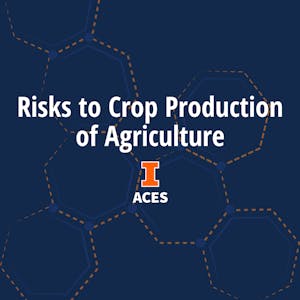Risks to Crop Production in Agriculture is a comprehensive course that delves into the intricate dynamics of agricultural risk management. Throughout this program, learners will explore the crop production cycles for annual and permanent food production crops, understand the financial characteristics and volatility of capital-intensive agriculture, and gain insights into the various types of land ownership and rental agreements in agriculture. Furthermore, the course delves into the personal, external, and food production risks that significantly influence decision-making in agriculture. This course is designed to provide a holistic understanding of the complexities involved in agricultural risk management, making it an invaluable resource for professionals and enthusiasts alike.
Certificate Available ✔
Get Started / More Info
Risks to Crop Production in Agriculture comprises six modules that cover a wide array of topics including crop production cycles, financial characteristics, land tenure, and influential factors in agriculture decision-making, providing a comprehensive understanding of risk management in agriculture.
The course orientation module provides an overview of the program, introduces the instructors, and familiarizes learners with the syllabus and flexible learning pathways. It also includes an orientation quiz and encourages interaction among classmates.
Module 1 delves into the crop production cycle, covering topics such as common production practices, permanent crops, harvesting, nutrient management, pest management, and the USDA crop calendar charts. This module also explores sustainable agriculture and U.S. agricultural policy review.
Module 2 focuses on the financial characteristics and risks in agriculture, discussing farm structures, capital intensity, cash flows, input vs. output prices volatility, and the transfer of agricultural land. It also provides insights into the farm sector income and finances.
Land tenure is the central theme of Module 3, exploring ownership of agricultural land, forms of ownership, rental agreements, land sustainability concerns, and U.S. farmland ownership, tenure, and transfer. This module provides a comprehensive understanding of agricultural land tenure.
Module 4 covers other factors influencing risk and decision-making in agriculture, including off-farm employment, agricultural policy, global trade flows, energy use, geopolitical issues, legal aspects, and livestock production risks. It also explores the impacts of economic crises and regional wars on global food security.
The course conclusion module wraps up the program, providing information about the graduate certificate course in risk and decision-making in agriculture, guiding learners on stacking their Coursera certificate toward graduate coursework, and completing the final assessment.
Strategically Build and Engage Your Network on LinkedIn: Learn to enhance your LinkedIn presence, expand your network, and boost engagement in this 1-hour project-based...
Digital Competition in Financial Services brings you insights about the intersection of digitalization and finance, with a focus on the competitive dynamics it gives...
This course provides a comprehensive introduction to operations management, focusing on analyzing and improving business processes to enhance productivity and quality...
Strategic Management equips you with the mindset and tools to thrive in today's dynamic business landscape. Embrace innovation and creativity to gain a competitive...